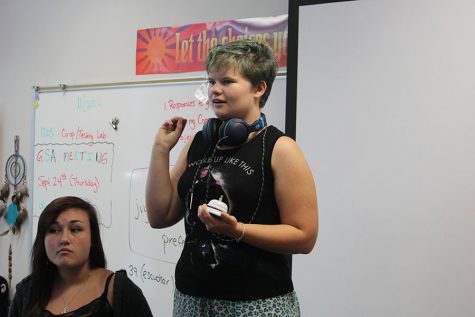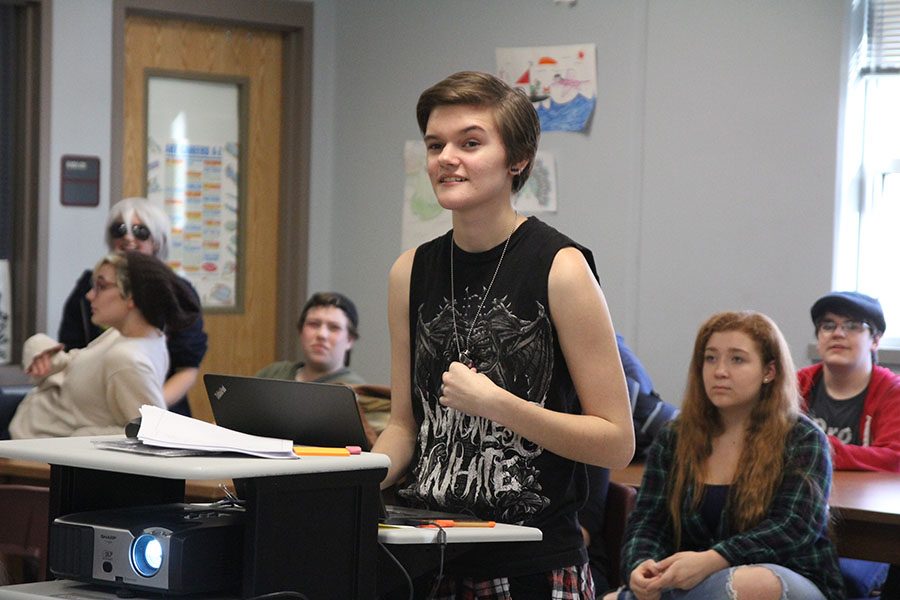GSA provides safe environment for LGBTQ+ teens
GSA president Avery Strait speaks to the group at a November meeting.
November 21, 2015
The loud chatter of conversations starts to boom inside the art room. Everyone flashes each other with their smiles. Suddenly art teacher Mallory McKenney, hushes the crowd. She and the club president start to present the to-do list for Gay Straight Alliance. There’s much to do and the meeting has just begun.
GSA is a safe place and welcomes anyone. It exists so the rest of the school’s community can help make the campus a safer place for those a part of Lesbian Gay Bi Transgender Plus. GSA is not just about the LGBT Plus community, though.
“It’s important for people to know about GSA,” McKenney said. “It is inclusive to everyone and it’s a supportive program.”
Around 50 years ago, the Gay Liberation Movement was only just beginning with the Stonewall Riots. Today, LGBTQ+ inclusive clubs and organizations have established themselves in thousands of high schools across the country.
The group is an organization aimed at raising awareness of the LGBTQ+ community, as well as serving as an inclusive space for LGBTQ+ youth.
“I feel it is a necessity because, when I was in high school, there wasn’t anything like this,” McKenney said. “I understand that there are kids who are questioning or curious or they don’t know what they’re feeling…but it’s good to have that support network, and I feel like it was kind of missing.”
The feeling of being accepted and safe is an important thing for GSA. The club leaders and sponsors try to make the meeting as comfortable and open as they can.
“I joined GSA to find other people like me and to become more involved in the LGBT Plus community itself,” freshman Myka McCraw said. “It’s like having a big family to help make the ride into high school easier. I’m always excited for the meetings it makes me week more enjoyable.”
Sophomore and club president Avery Strait believes GSA is a safe haven for those who need one.
“It’s very family like,” Strait said. “We’re all very close knit, and, with lack of better words, it’s like a no hate zone. The whole school is ‘quote’ no hate, but you go there and it’s like your safe place. You can talk about anything and everything, and it stays there.”
This is only the second year for the club.
“This year there is already a lot more buzz about it (GSA) than there was last year,” junior Glen Smith said. “The main goal of the club is to educate and to give people a safe place to be themselves.”

Glen Smith speaks at a September GSA meeting.
While GSA is currently the largest club on campus, they have still had their setbacks.
“Last year we couldn’t do any fundraisers because of miscommunication with the officers and our sponsors,” Smith said. “This year it’s already a lot more smooth so we’ve fixed that. This year we were prevented (really sadly) from starting our meetings as soon as possible because the school changed a lot about advocate on us.”
Students in the district have even had troubles with starting GSA clubs themselves in the past.
“My wife graduated about 10 years ago at Cedar Park, back when it was just Cedar Park and Leander, and her and her friends wanted to start a GSA, and their admin told them at the time, ‘No, it’s inappropriate, and don’t ever bring it up again,’ but that’s changed quite a bit,” McKinney said.
The club is pretty much all inclusive. It is open to anyone wanting to know more about it, or who are wanting to join or support.
“Everyone is welcome,” Smith said. “GSA welcomes those who are different and those who are allies. A lot of people are still in that mentality that if they go, they’re gay, and that’s not true.”
The club meets on Tuesdays after school on Tuesdays in room 6101. For members, GSA is a safe place to let everyone know that it’s normal to be different.
“You don’t feel like you are isolated from the world,” freshman Alex Lucas said. “You have others who are like you. The feeling of being alone no longer becomes a problem.”



